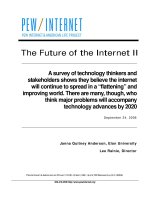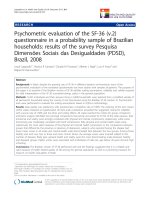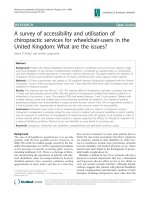INDUSTRY SURVEY - What future animators say about what they are looking for in a school, and what professional animators say are the most important things to look for. ppt
Bạn đang xem bản rút gọn của tài liệu. Xem và tải ngay bản đầy đủ của tài liệu tại đây (13.42 MB, 14 trang )
INDUSTRY SURVEY
What future animators say about what they are looking for in a
school, and what professional animators say are the most
important things to look for.
Quotes throughout are from professional animators who responded to this survey.
Other information from this survey was previously published as a
“Special Report: Behind the Characters”
TABLE OF CONTENTS
.................................................................................
1
..........................................................................................................................................................
1
...........................................................................................................................................................................
2
I.
How Students Choose an Animation School
II.
Survey Methodology
III.
Survey Findings
IV.
Criteria by Country
.................................................................................................................................................................
4
What Professional Animators Say Is Important about Getting
a Good Animation Education ................................................................................................................................
5
VI.
What Advice Would You Give to New Animators? ...............................................................
6
VII.
Survey Conclusions
7
V.
...............................................................................................................................................................
VIII. Recommended Next Steps
IX.
X.
........................................................................................................................................
Overview of Animation Training Opportunities
....................................................................
Additional Free Learning Resources
From AnimationMentor.com ...............................................................................................................................
8
8
10
3D is just right for me. My strength is art skills and innovative solutions.
I get to use both my creative and technical skills.
I love to work when the people around me are
creative, talented and organized team players.
“
“
I. HOW STUDENTS CHOOSE AN ANIMATION SCHOOL
This report discusses the results of a recent survey of prospective animators, professional animators, and
students who were interested in pursuing an education in animation. They were asked to share with us the
criteria they used in choosing a school, and what things they thought were most important in choosing an
animation college or training program.
II. SURVEY METHODOLOGY
In Fall 2008, Animation Mentor commissioned third-party independent research firm, Knowledge Wave
International, to conduct an industry survey to better understand the trends in animation careers, job
satisfaction and salaries.
The survey used a list of 40,000 AnimationMentor.com subscribers and got a 12.4% response rate with an 8.4%
completion rate. 18% of respondents were interested in animation as a career and seriously considering enrolling
in an animation program.
These prospective students indicated the list of criteria they used to select an animation school, or animation
education program, and told us what they thought was most important. It was interesting to see that students
from different countries had different priorities when choosing an animation university or college.
Copyright 2009 by AnimationMentor.com. All rights reserved. This report may not be reprinted
or distributed in electronic, print, web, or other format without express written permission.
“
“
As an animator, I get to learn about a
whole spectrum of subjects.
Every project requires research of some form.
1
III. SURVEY FINDINGS
Of the 7,200 respondents who were considering enrolling in an animation program, 33% rated the ability to learn
from professional animators as the most important criteria in selecting an animation school.
Next most important was the ability to learn remotely, which came in at 21%.
Which of the following will be the primary criteria you
use for selecting an animation education program?
33% Mentors and faculty are professional animators
21% Ability to learn remotely and/or online
15% Quality of student work
11% Lowest cost
8%
Reputation of school
7%
Industry connections
5%
Track record for placing students
When we asked what was most important in getting a quality animation
education, the two areas that tied at 23% were the quality of the
curriculum, and having an innovative teaching/learning experience.
These respondents also highly valued the ability to get individual
attention. Interesting to note, only 5% of respondents highly
valued a school’s ability to place graduates in animation jobs.
In this current economy, it may become a more important
factor to consider when evaluating schools.
Copyright 2009 by AnimationMentor.com. All rights reserved. This report may not be reprinted
or distributed in electronic, print, web, or other format without express written permission.
2
What is MOST important to you?
4%
Ability to network
4%
Accessibility
9%
Direct interaction with students and faculty
12%
Flexibility around my life
21%
Individual attention
Quality of curriculum
Innovative teaching/learning experience
23%
23%
57% of the respondents to this survey believed that they would get more individual attention from an online
animation school than they would at a traditional brick and mortar school.
However, most of these respondents are familiar with AnimationMentor.com’s teaching model, which includes
individual attention from mentors, individual critiques on their projects, live question and answer sessions with
mentors, and tons of interaction with peers. They may not realize that not all online schools offer the same level of
individual attention that AnimationMentor.com does. Therefore, if you are shopping around, be sure to find out
exactly what the teaching/learning model is before you commit to an online animation training program.
Copyright 2009 by AnimationMentor.com. All rights reserved. This report may not be reprinted
or distributed in electronic, print, web, or other format without express written permission.
3
“
As an educator, I find watching students start from very little
and then develop their understanding, ability and style most rewarding.
Watching their imaginations expand is the real kicker.
“
BRICK & MORTAR
Which type of
DEGREE / CERTIFICATION
program do you think is the
best for each of the following
elements of your studies
animation program
ONLINE
4 - YEAR
animation program
degree program
in animation?
Ability to network
23%
18%
60%
Direct interaction with
students and faculty
42%
26%
31%
Class size
29%
22%
49%
Individual attention
24%
18%
57%
Quality of curriculum
45%
15%
40%
8%
7%
85%
Accessibility
11%
8%
81%
Innovative teaching /
learning experience
23%
10%
67%
Flexibility around my life
IV. CRITERIA BY COUNTRY
The above charts are an aggregate of all respondents both male and female from all the countries that participated.
When we analyzed the same questions and looked at responses by country, we found there were some interesting
differences. Although these sample sizes may not be large enough to draw statistically valid conclusions, we saw
definite trends that were of interest.
For example, Australian’s criteria for selecting an animation education program placed more emphasis on the ability
to learn remotely at 38%, and the quality of student work at 31%, than learning from professional animators at 15%.
Canadians also highly valued the quality of student work at 35%. Respondents from Germany, India, Mexico, Spain,
the United Kingdom, and the U.S. all favored learning from professionals as their top criteria.
When we looked at what was most important to potential students about their education by country, Australia,
Canada, Germany, the U.S. and the UK chose quality of curriculum as their top picks. Canada also highly valued
individual attention, as did Italy at 50% and the United Kingdom at 41%. Brazil, India and Spain chose having an
innovative teaching/learning experience as most important.
Copyright 2009 by AnimationMentor.com. All rights reserved. This report may not be reprinted
or distributed in electronic, print, web, or other format without express written permission.
4
V. WHAT PROFESSIONAL ANIMATORS SAY IS IMPORTANT
ABOUT GETTING A GOOD ANIMATION EDUCATION
We asked professional animators about the type of education they got and what they thought was most
important to getting started in their animation career.
Although professional animators got their education in a variety of different ways, they all agreed that in order to
really learn animation and improve their skills, it was really important to have a mentor. Even on the job, most of
them continue to learn and advance from the input they get from mentors.
In fact, 95% of respondents said having a mentor is important to advancing your education as a professional
animator. They also state the importance of creating and maintaining a professional network. One in five
animators say they have a mentor at work, while having a mentor is in the top three recommendations for
kick-starting a career, following industry experience and education.
Type of EDUCATION Professional Animators Received
12%
Online animation school
31%
Traditional art school
45%
Self-taught / Mentored
(non-academic)
47%
Animation-specific
school
Copyright 2009 by AnimationMentor.com. All rights reserved. This report may not be reprinted
or distributed in electronic, print, web, or other format without express written permission.
5
VI. WHAT ADVICE WOULD YOU GIVE TO NEW ANIMATORS
ABOUT HOW TO GET YOUR FIRST JOB?
8%
11% Specialize
Other
19% Build strong
industry connections
in one main
animation skill
11%
Complete an
education from
a reputable art
or animation school
51%
Create a high quality
DEMO REEL
“
“
What I love most is the magic of animation, and the ability to
inspire emotions from an audience with images.
Copyright 2009 by AnimationMentor.com. All rights reserved. This report may not be reprinted
or distributed in electronic, print, web, or other format without express written permission.
6
We asked professional animators what advice they would
give to people who wanted to become animators. More
than 50% said creating a high quality demo reel is the one
thing they would suggest to new graduates of animation
trying to land their first job. This is more important than
anything else and goes to show that it’s not who you know,
but how good you are at what you do, that determines
who gets the jobs in this industry.
Be sure that wherever you get your animation education,
you will also have the opportunity to create a great demo reel.
This is your calling card to use when you interview for jobs in
the industry. It showcases your best work to prospective
employers and shows them exactly what skills and disciplines
you excel in. Whether you want to be a character animator, or
work in lighting, rigging or modeling, your reel should reflect
that and be a way for them to see what you can do.
One way to judge a school is to look at the quality of the student
work. Most schools have a show reel of their best students’ work
that will give you a sense of what you can expect to learn. If the
quality of the work is high, you know you will get a good
education and come out with a good reel.
For more information about animation careers, salaries, job
satisfaction and animation industry trends, see our other industry
report that you can download for free:
/>
VII. SURVEY CONCLUSIONS
Because of the busy lifestyles of many of these potential students
who have to juggle part-time or full-time jobs, families, and other
responsibilities, the flexibility of being able to learn from home,
not having to move to a school location, or commute were very
important to them when choosing a school.
That said, there are many animation training options that offer online
accessibility and flexibility. But not all of them offer the same quality
of curriculum, and level of skill development. That’s why what was
most important to our respondents was the quality of the curriculum,
having an innovative learning/teaching experience, and getting the
individual attention and feedback they need to grow.
Copyright 2009 by AnimationMentor.com. All rights reserved. This report may not be reprinted
or distributed in electronic, print, web, or other format without express written permission.
7
Another area of key importance to these prospective students was
ensuring they were learning from professional animators.
VIII. RECOMMENDED NEXT STEPS
If you are currently looking for an animation school and have clearly defined your personal
and professional goals so you know what type of animation training you would like to have,
the next step is to research and interview schools to make sure they offer the flexibility, quality
of curriculum, individual attention, and mentoring from professional animators that you require.
IX. OVERVIEW OF ANIMATION TRAINING OPPORTUNITIES
There are a wide variety of animation universities, animation colleges, animation schools, books, DVDs, tutorials,
and online resources that offer some sort of animation training. You can find courses ranging from special effects
to lighting to character animation. Some traditional art schools that offer four-year degrees also have an
animation curriculum. There are also online schools that specialize only in a certain type of animation, such as
AnimationMentor.com which offers an 18-month program specifically in character animation.
Specialized programs like this are not for everyone. That’s why the most important thing is to first figure out what
type of animation you want to do, then find the school that best teaches those skills. If you are still exploring your
options, you may want to download our free guide, How to Become an Animator, which provides information
on types of animation jobs, free resources, and things to consider when choosing an animation school. You can
find it at www.animationmentor.com/landing/becomeanimator.
“
Doing what I love everyday is the
most rewarding thing I can think of.
That includes animating, drawing,
and creating fun and
enjoyable entertainment.
“
Copyright 2009 by AnimationMentor.com. All rights reserved. This report may not be reprinted
or distributed in electronic, print, web, or other format without express written permission.
8
ABOUT
ANIMATIONMENTOR.COM
Animation Mentor is the only animation school built by professional animators specifically for people who want to
become character animators. Animation Mentor teaches you the art behind animation under the guidance of
professional animators who are currently working at leading studios. Our approach also prepares you with the skills
needed to succeed as a professional character animator in a studio environment.
By graduation, every student has worked in a production-style environment where mentors, who are working
studio animators, stand in for directors, and assignments stand in for film or game shots. Students learn how to
accept guidance and criticism, to meet deadlines, and to budget and schedule their time to succeed in the working
world. At the end of the 18-month program, students leave with a professional demo reel they can use as their
résumé to land jobs. Upon graduation, Animation Mentor coaches graduates and helps them locate job
opportunities with major recruiters, video game companies, and film studios. Animation Mentor has a 78% job
placement rate worldwide.
To learn more about our online animation school, visit www.AnimationMentor.com
Copyright 2009 by AnimationMentor.com. All rights reserved. This report may not be reprinted
or distributed in electronic, print, web, or other format without express written permission.
9
X. ADDITIONAL FREE LEARNING RESOURCES FROM ANIMATIONMENTOR.COM
ANIMATION TIPS AND TRICKS, VOLUME I
The first edition of our Animation Tips and Tricks eBook featuring
how-to articles and information from Industrial Light & Magic (ILM)
animator Shawn Kelly who is also a cofounder of
AnimationMentor.com
ANIMATION TIPS AND TRICKS, VOLUME II
More tips and tricks from Animation Mentor founders and mentors
including Shawn Kelly, Carlos Baena, Keith Sintay, Aaron Gilman and
Wayne Gilbert.
WWW.ANIMATIONTIPSANDTRICKS.COM
Animation Mentor’s animation tips and tricks blog featuring advice
and mentoring from professional working animators.
THE ANIMATION INDUSTRY SPECIAL REPORT
Behind the Characters: Job Satisfaction, Career Outlook and Salary
Survey is an industry report chock-full of industry statistics, facts,
figures and survey responses from more than 1,200 professional
animators.
Copyright 2009 by AnimationMentor.com. All rights reserved. This report may not be reprinted
or distributed in electronic, print, web, or other format without express written permission.
10
ANIMATION INDUSTRY NEWS
The AnimationMentor.com newsletter features special features
about the animation industry, animation careers, and advice and
tips from our mentors. In addition, you can see what Animation
Mentor students are working on and get the inside scoop on how
they are creating animation.
CARLOS BAENA’S BLOG
Animation Mentor cofounder and Pixar animator Carlos Baena
shares his techniques for animating along with movies he likes, and
artwork he gets inspiration and ideas.
BOBBY BECK’S BLOG
Animation Mentor cofounder and CEO Bobby Beck talks about
what it takes to be an animator and how to stay inspired, motivated
and creative in life and on the job.
Copyright 2009 by AnimationMentor.com. All rights reserved. This report may not be reprinted
or distributed in electronic, print, web, or other format without express written permission.
11









